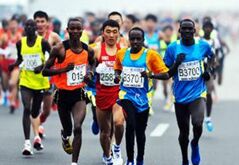北京举行超级马拉松比赛
Despite temperatures of around 30-degrees on Sunday, hundreds turned out in southwest Beijing to take part in what's known as an ultra-marathon.
More than twice the distance of a marathon, which is just over 42-kilometers, ultra-marathons are considered - by those who run them - the ultimate test of personal endurance.
Among those taking part is long-distance running veteran Chen Penbin.
The 38-year old is one of the less-than 100-people who has run ultra-marathons on all 7 continents, managing to win the Antarctic ultra-marathon at one point.
He admits the conditions in Beijing are a significant departure from running at the bottom of the world.

"I admit I'm a bit exhausted right now. I've run in four different marathons before arriving here in Beijing, so I think I'll just be happy to finish this event. But it's going to be tough. Right now it's only 7 in the morning, and the sun is already strong. By the afternoon, I expect temperatures are going to be even higher, which is likely going to make me particularly uncomfortable."
Like all long-distance running events, the health of the athletes taking part is a major concern.
Li Xiaoqiang is the vice-Secretary General of the Beijing Athletics Association, which is a co-organizer of the Beijing event.
He admits keeping the runners healthy is a major challenge in an ultra-marathon.
"Pre-assessment is the key. We always do pre-assessments before organizing any sporting events. We carefully examine the potential impacts the event will have on the athletes, and take steps to keep the risk to the runners minimal, while at the same time, providing them with a positive experience. This involves knowing the layout of the running course itself, what the best time to hold the race will be, and what we need to provide during the race itself."
Long-distance running in China has exploded in popularity over the past couple of years.
Last year, the Chinese Athletics Association officially registered 134 marathons across China, which is well more than double the 51 races which were officially sanctioned in China the year before.
Hoping to capitalize on potential revenues from events like that, over 80-cities in China put on marathons last year, which is close to 30-more than in 2014.
But for the athletes themselves, events like the 100-kilometer race in Beijing on Sunday has little to do with money.
"I first decided to get into long-distance running just after I broke up with my ex-boyfriend. I've been running marathons for more than two years, and it really helped me get through a difficult time in my life. It's given me confidence by challenging myself to take part in various running events. It's also made me more physically and mentally stronger. I think running has allowed me to adopt a positive attitude towards any ups and downs in my life."
"I drive a lot and I've suffered from intense pain in my back and waist for quite some time. But after running marathons the past couple of years, I feel much better. My diet has changed, improving my health and my sleeping habits as well."
Sunday's ultra-marathon in Beijing is part of the 'Challenge 100' series, which is being held in other major cities in China.
Winners of those events will qualify for the 'Challenge 100' Final, which will be held in Beijing on June 26th.
For CRI, this is Guo Yan.
- 上一篇

- 下一篇



 手机网站
手机网站